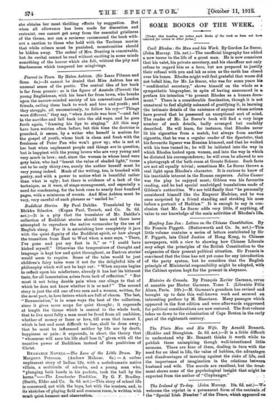Buddhist Stories. By Paul Dahlke. Translated by the Bhikku Silacara.
(Kegan Paul, Trench, and Co. 3s. 6d. net.)—It is a pity that the translator of Mr. Dahlke's collection of Buddhist stories should here and there have attempted to reproduce the native vernacular by the use of English slang. For it is astonishing how completely it jars with the quiet dignity of the Buddhist spirit, or how abrupt the transition from East to West when a man says, '• There, I've gone , and put my foot in it," or " I could have kicked myself." Otherwise the temperature of thought and language is kept low and quiet throughout, as Eastern stories would seem to require. Some of the tales would be just children's fairy tales were it not for the delightful bits of philosophy which will not be kept out : " Wheh anyone begins to reflect upon his misfortune, already it has lost its bitterest taste, for all lamentation arises from lack of reflection." " But must it not bring double pain when one clings to that of which he does not know whether it is or not ?" The second story is just the old one of two men and a woman, written, for the most part, in love letters which are full of charm. The last, " Renunciation," is in some ways the best of the collection, since it gives more scope for quiet thought; it expounds at length the theme which is central to the whole hook, that to live most fully a man must be freed from all ambition, whether of money or fame or love, till even that inmost I, which is last and most difficult to lose, shall be done away ; that he must bs influenced neither by life nor by death, happiness or pain : it expounds, in short, the theory that "whosoever will save his life shall lose it," given with all the negative power of Buddhism instead of the positivism of Christ.














































 Previous page
Previous page